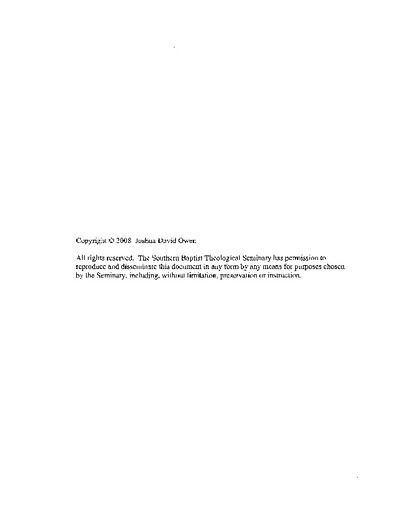| dc.contributor.advisor | Cook, William F., III | |
| dc.contributor.author | Owen, Joshua David | |
| dc.date.accessioned | 2010-01-08T16:18:44Z | |
| dc.date.available | 2010-01-08T16:18:44Z | |
| dc.date.created | 2008-03-25 | |
| dc.date.issued | 2008-03-25 | |
| dc.identifier.other | THESES Ph.D. .Ow2m | |
| dc.identifier.uri | http://hdl.handle.net/10392/479 | |
| dc.description.abstract | This dissertation examines the relationship between martyrdom and divine retribution against the martyr's persecutors in the book of Revelation. The argument is made that Revelation portrays martyrdom as an impetus of Divine retribution against the persecutors of the martyrs. Chapter 1 traces the trend in recent scholarship to view Revelation's portrayal of martyrdom as contributing to the conversion of the nations. Basic assumptions of this view are discussed, as well as some replies from traditionalists.
Chapter 2 discusses the methodology and sources used to defend the thesis. A discussion of intertextuality in the book of Revelation leads to the conclusion that the Old Testament, and particularly the prophetic tradition of Israel, is the primary background. The genre analysis leads the author to adopt a modified idealist approach to the symbolism of the book.
Chapter 3 argues that martyrdom is the confirmation of the saints' testimony against the persecutors of the church. It is argued that the concept of witness is drawn from the background of God's legal contest with the nations in the Old Testament prophets. The climax of the witnesses' testimony is their martyrdom.
Chapter 4 argues that martyrdom determines the sentence against the persecutors based on the lex talionis. The persecutors of the church seal their own fate by striking down God's faithful witnesses. The evil of persecution that leads to martyrdom is exacerbated by the identification of Christ with his witnesses. The vindication of the martyrs is also the vindication of their witness to Christ.
This dissertation contends that Revelation's theology of martyrdom should not be conformed to Paul's theology of suffering, but should be understood as a complement to it. John's encouragement is not that the blood of the martyrs is seed, but that the blood of the martyrs is precious to Christ, who will avenge it in God's time. | en_US |
| dc.language.iso | en_US | en_US |
| dc.subject | Martyrdom (Christianity) | en_US |
| dc.subject | Bible.--N.T.--Revelation--Criticism, interpretation, etc. | en_US |
| dc.subject | Christian martyrs | en_US |
| dc.title | Martyrdom as an impetus for divine retribution in the book of Revelation | en_US |
| dc.type | Thesis | en_US |
| dc.publisher.institution | Southern Baptist Theological Seminary | en_US |

